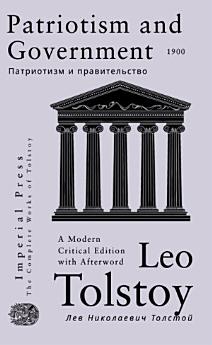Patriotism and Government
About this ebook
The essay argues that patriotism is a manufactured emotion that lets governments conscript ordinary people to fight wars benefiting only officials and capitalists. Tolstoy points to career soldiers promoted for “patriotic” zeal and civil servants rewarded for stirring national pride, insisting that “the more patriotic a man is, the higher he rises”—a cycle that makes slaughter respectable and dissent treasonous. He calls on readers to reject every appeal to flags and frontiers and to recognise all humans as one family, a stance that placed the essay alongside his earlier tracts Christianity and Patriotism and The Kingdom of God Is Within You as part of a sustained anti-state polemic.
This critical reader's edition presents a modern translation of the original manuscript, crafted for the modern reader with clean, contemporary language and simplified sentence structures that clarify his complex Russian phrasing and specific antiquated references. Supplementary material enriches the text with autobiographical, historical, and linguistic context, including an afterword by the translator on Tolstoy’s personal history, impact, and intellectual legacy, an index of the philosophical concepts he employs—emphasizing Existentialism and influence by Schopenhauer—a comprehensive chronological list of his published writings, and a detailed timeline of his life, highlighting the personal relationships that shaped his philosophy.











